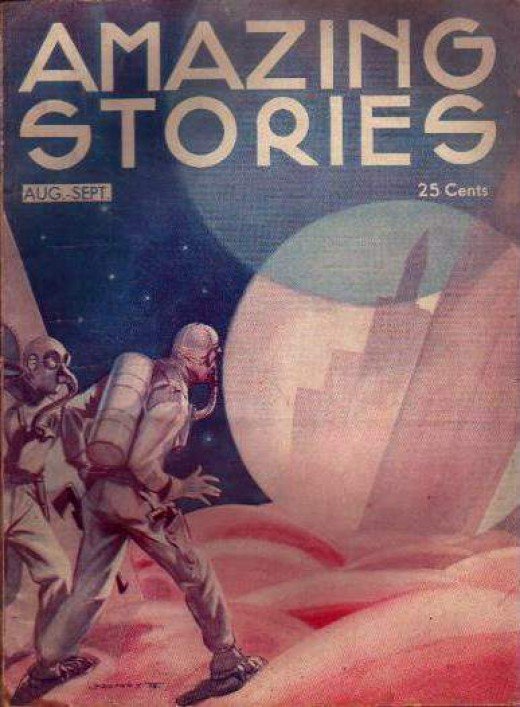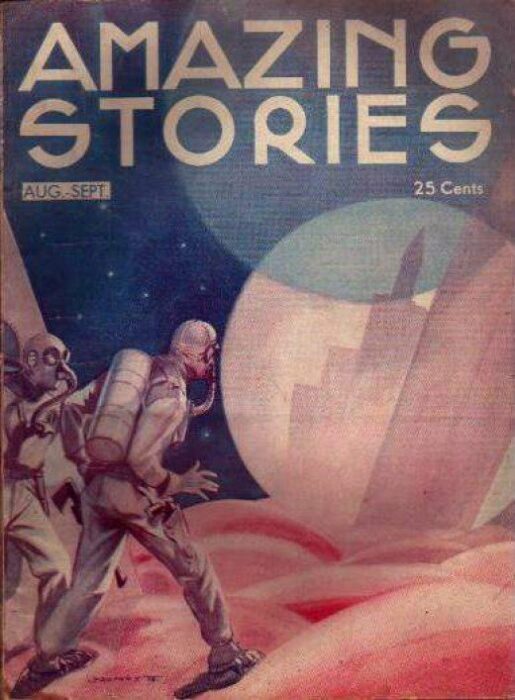In Praise of Short Stories
There was a time when the world abounded with short stories. Great authors wrote brief masterpieces, securing their places in literary history and in English courses throughout North America; great books were introduced to the world as serialized novels. The mediocre and the obscure – overlapping but not homogeneous groups – found their  footing in pulp magazines, making their appeal to niche markets.
footing in pulp magazines, making their appeal to niche markets.
But the short story faded. The magazines were mostly shut down, the new great authors wrote long masterpieces, and novels were published all at once. Established authors might get their short stories published in anthologies or – especially if the story was about Christmas – in little hardbacks with trite Hallmark illustrations meant to justify charging readers fifteen bucks for a crummy twenty thousand words. (They didn’t.) But the days when writers could make their fame or living by short stories were over.
Now novels are, more and more frequently, simply one part of a book series, as movies are one part of a franchise. So while stories grow longer and longer, I want to speak a word in praise of short stories. For years I’ve been making my way through the sci-fi short story collections on Librivox. I didn’t begin with any real appreciation of short stories, but I learned it. I learned to see what advantages short stories uniquely possess.
Ideas and styles that aren’t suited to long works find expression in short stories. Such ideas and styles aren’t inherently worse, but they are different. “Ask a Foolish Question” tells a sci-fi story in a fairy-tale form and it is entrancing, but it would grow awfully thin stretched out to three hundred pages. This story is devoted to a single thought, profound though melancholy, that our trouble isn’t that we don’t know the answer; it’s that we don’t know the question. No novel can be built on a single thought, because one thought just doesn’t go far enough. But short stories can be, and that is one of their noblest functions: to catch those stray ideas or images that would otherwise just drift away.
Short stories are also the playground of an old game in science fiction: trick the readers with their own assumptions. Here is how it is played: First, center the story around a classic conflict but hide one basic, vital fact; trust that the audience will automatically complete the picture with some natural assumption, and it will be wrong; write the story in a way that supports the readers’ misperception without truly affirming it; at the end, reveal the truth.
This game, difficult to sustain for very long, is really only suited to the format of short stories, and even there writers commonly lose. Readers learn to play, too. “Rough Beast” and “Runaway” attempt the game, if you want to see it done. (“Runaway” sort of devastated me; I mean this as a warning, but I know it just makes you want to read it more.)
Finally, short stories require only a minor investment of time. They don’t take the commitment that novels do, or incur an equal cost when they’re not worth it. That frees you to be less selective and more adventurous in your reading. You may even discover stories of poor quality that have, among all the chaff, a valuable kernel of wheat. I have read short stories that, for all their deficiencies, had an image or an idea that stayed with me.
Short stories have to know their end and pursue it with devotion; where they don’t have time for depth they must compensate with color. The difference between short stories and novels is not only length; short stories are not simply less. They are their own art form, and I say – bring them back.





























Yes!
I couldn’t agree more!
This is a part of the reason I started producing short stories by Christians five years ago on the Untold Podcast. (We released our 75th episode this morning) http://www.untoldpodcast.com
Good short stories are like an elite strike team. They quickly invade our imaginations, so their job and withdraw. But the work they did on our imaginations remains!
I heartily agree that the Short Story literary form is a treasure worth seeking — and reviving.
I’m delighted to learn about the Untold Podcast, and will certainly subscribe.
But does anyone know of any other sources of short story publication — especially in the Christian market? If so, please share them here!
This REALLY seems like something that should exist on the Internet, even if it’s just a step above a clickbait site, full of junky ads. But aside from user-submitted, forum-type sites like DeviantArt or fanfiction.net or Wattpad, there’s not really anything. And the downside about the non-curated sites is that you have to dig through a lot of amateur junk to find anything good.
There are probably more short story venues now than there have ever been, and more short stories being published than ever before. May I recommend Beneath Ceaseless Skies, Uncanny, Lightspeed, Strange Horizons, Daily Science Fiction, Apex Magazine, and Clarkesworld. All these venues pay professional rates (6 cents per word or more), so they get high quality stories, which they publish for free online.
If you’re interested in podcasts, there’s Escape Pod, Podcastle, Pseudopod, and Cast of Wonders–they also pay professional rates, and are also available for free. Plus many of the other venues mentioned earlier produce podcasts of many of their stories.
If you’re willing to pay, and want physical magazines, there’s Fantasy and Science Fiction, Orson Scott Card’s Intergalactic Medicine Show, Analog Science Fiction and Fact, Asimov’s Science Fiction, and Deep Magic.
And if you’re specifically interested in Christian speculative fiction, there’s our own Mysterion–the anthology’s out now, and new fiction is coming to the website (http://www.mysteriononline.com) starting in April.
To be fair, many of these are pretty progressive (Clarkesworld, for example), and if you’re not a fan of social justice themes you may find them irritating. But there are a lot of magazines out there, and I only named pro-paying publications. There are hundreds of other magazines and anthologies, online and paper.
A lot of helpful links and info here, Donald. Thanks for that.
In addition, there’s a lot of interesting short stories and articles on the FaithWriters.com site.
To see some of my short stories there, try this link: https://faithwriters.com/member-profile.php?id=26565
But there are plenty of other writer’s works listed by topic as well: https://faithwriters.com/search-browse.php
Tor.com also publishes short fiction online, for free (they do pay pro rates, but don’t consider unsolicited submissions, so authors have to be fairly well established to get their stories published there–they pay far more than anyone else, though, and the quality is very high).
And there are anthologies of new short stories coming out literally all the time, if you want actual books (print or electronic). If you’re not deeply immersed in the world of speculative fiction publishing, it can be harder to find them. A search for “anthology” on Amazon under Books < Science Fiction & Fantasy brings up quite a few (although keep in mind that the "Sponsored" ones are often for books that were probably less selective in choosing stories (though not always)). Tangent Online often reviews new anthologies as well, and they'll only review the ones that pay pro rates (the amount that authors are paid is not always correlated to the quality of the stories, but it's not completely unrelated, either).
Hmmm. Donald,you seem to me to be wholly unconcerned about the problems short stories face from sites like Wattpad, which give away short stories for free, and the fact that Amazon, the number one distributor of stories in much of the English-speaking world, has no zone in pricing set aside for short stories–meaning a 99 cent short story (the minimum price) has to compete with whole novels for the same price. Which is not good for indie sales of short stories.
While it is also true that there are paying markets for short stories as well that are thriving, I think overall the business of selling an indie short story, especially one deliberately Christian in theme, is a tougher prospect than selling a novel with Christian themes (in speculative fiction). Not only as an indie, but in general.
Of course you know I hold your work at Mysterion in high regard, but it’s just one anthology. Hardly a major source of Christian Speculative Fiction as of the moment. I’ve got six anthos at Bear Publications, though two of them are wholly composed of my own stories, so perhaps they should not count. But with 4 anthologies of Christian speculative short stories by multiple authors, I feel I’ve barely scratched the surface!
Splickety Publishing, specifically Havok Magazine, of course has a wide variety of speculative fiction shorts. But all of theirs are under 1000 words, so they offer no help to selling short stories over 1K words. (http://splickety.com/imprints/havok-magazine/). Nor is Havok specifically Christian in theme, though it does publish flash fiction with Christian themes at times.
In short, I agree with Shannon that short stories are having some troubles, though I’d say so especially for stories with Christian themes–and that’s true even though you and I and others are working on making such stories available.
I’m joining this conversation rather late, but the problem with short stories is not that they are not available, but that they are difficult to sell individually in a market dominated by Amazon, in which a minimum price for books is 99 cents, so that’s the bottom an individual can sell a story for–but that’s also the price whole novels are bought and sold for. Meaning an individual short story either has to be free, be in an anthology, or be in a magazine to be distributed, realistically speaking.
Plenty of e-zines have been free and Wattpad is specializing on giving away short stories for free. So I agree that selling short story anthologies can be a bit tough–which is part of why I founded Bear Publications–trying to sell anthologies of Christian Speculative fiction. We currently have 6 titles available, though (full disclaimer) all but one feature one or more stories written by me:
http://bearpublications.com/anthology-titles/
Just read Runaway. I’m slayed by it. Thanks for linking to it.
Here’s something to consider. Short stories do not generate much revenue on Amazon. BUT grinding out 4 or 5 novels a year is exhausting unless you cheat by using formula templates. And one novel a year makes you less visible on Kindle.
Solution? Write 5-10 short stories between 2500 and 5000 words each. Offer them for free along with a novel priced $3.99. Maybe add a novella for $2.99. Free samples help hook readers.
Flash fiction can be posted on blogs–your own or a contest on someone else’s. It can also be presented in Youtube videos or microfiction bits on Facebook.